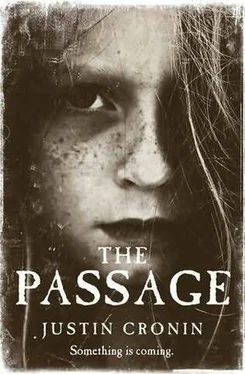“I don’t have to,” Sykes said. “Wait for my call.”
Wolgast clicked off the phone and stepped into the station. The attendant, a trim Indian man in a turban, was sitting behind the bulletproof glass, watching a church show on TV. The girl was probably hungry; Wolgast got some peanut butter crackers and some chocolate milk and took it to the counter. He was looking up, noticing the cameras, when his handheld buzzed at his waist. He paid quickly and stepped outside.
“I can get you a car out of Little Rock,” Sykes said. “Somebody from the field office can meet you if you give me an address.”
Little Rock was at least two hours. Too long. Two men in suits, a little girl, a black sedan so plain it couldn’t have been more obvious. The nuns had probably given the plate number, too. There was no way they could go through the scanner on the bridge; if the girl had been reported as a kidnap victim, the Amber Alert system would be activated.
Wolgast looked around. Across the avenue he saw a used-car lot, strings of multicolored banners fluttering above it. Most of the cars were junk, old gas guzzlers nobody could afford to fill anymore. An old-style Chevy Tahoe, ten years if it was a day, was parked to face the street. The words EASY FINANCING were stenciled on the windshield.
Wolgast told Sykes what he wanted to do. At the car he gave Doyle the milk and crackers for Amy and jogged across the avenue. A man with huge eyeglasses and a flapping comb-over stepped from the trailer as Wolgast approached the Tahoe.
“A beaut, isn’t she?”
He got the man down to six grand, which was nearly all the cash he had left. Sykes would have to see to the money question, too. Because today was a Saturday, the paperwork on the Tahoe wouldn’t hit the DMV computers until Monday morning. By then, they’d be long gone.
Doyle followed him to an apartment complex about a mile away. Doyle parked the car in back, away from the road, and carried Amy to the Tahoe. Not perfect, but as long as Sykes got somebody to ghost the car by the end of the day, they’d be untraceable. The inside of the Tahoe smelled too strongly of lemon air freshener, but it was otherwise clean and comfortable, and the mileage on the odometer wasn’t bad, a little over ninety thousand.
“How much cash do you have?” he asked Doyle.
They put their money together: they had a little over three hundred dollars left. It would cost at least two hundred bucks to fill the tank, but that would get them to western Arkansas, maybe as far as Oklahoma. Somebody could meet them with cash, and a new vehicle too.
They crossed back into Mississippi and turned west toward the river. The day was clear, just a few clouds ribboning the sky. In the backseat, Amy was motionless as a stone. She hadn’t touched the food. She was just a little bit of a thing, a baby. The whole thing gave Wolgast a sick feeling in his stomach-the Tahoe was a rolling crime scene. But for now he had to get them out of the state. Beyond that, Wolgast didn’t know.
By the time they were approaching the bridge it was nearly one o’clock.
“You think we’re okay?” Doyle asked.
Wolgast kept his eyes straight ahead. “We’ll find out.”
The gates were open, the guardhouse unmanned. They sailed through easily, across the wide girth of the muddy river, swollen with spring runoff. Below them, a long line of barges pushed obliviously northward against the foaming current. The scanner would log their vehicle signature, but the car would still be registered to the dealer. It would take days to sort it all out, to check the video stream and connect them to the girl and the car. On the far side, the road reclined to the open fields of the western floodplain, sodden with moisture. Wolgast had thought about the route carefully; they wouldn’t hit a good-sized town until they were nearly to Little Rock. He set the cruise control for fifty-five, the posted limit, and headed north again, wondering how it was that Sykes had known just what he’d do.
By the time the van bringing Anthony Carter pulled into the compound, Richards was asleep in his office, his head on his desk. His com buzzed to wake him; it was the guardhouse, telling him Paulson and Davis were outside.
He rubbed his eyes, brought his mind into focus. “Bring him straight in.”
He decided to let Sykes sleep. He stood and stretched, called for a member of the medical staff and a security detail to meet him, then put on his jacket and took the stairs up to ground level. The loading dock stood at the rear of the building, on the south side, facing the woods and, beyond that, the river gorge. The compound had once been some kind of institute, a retreat for corporate executives and government officials. Richards was a little vague on the history. The place had been closed up for at least ten years before Special Weapons had taken it over. Cole had ordered the Chalet dismantled piece by piece to excavate the lower levels and build the power plant; they’d then rebuilt the exterior almost exactly as it had been.
Richards stepped into the gloom and cold. A wide roof was suspended over the concrete dock, keeping the surface clear of snow and obstructing the view from the rest of the compound. He checked his watch: 07:12. By now, he figured, Anthony Carter would be a psychological wreck. With the other subjects, there had been time for adjustment. But Carter had been plucked straight off death row and landed here in less than a day; his mind would be tumbling like a dryer. The important thing in the next two hours was to keep him calm.
The space swelled with the headlights of the approaching van. Richards descended the steps as the security detail, two soldiers wearing sidearms, jogged in out of the snow. Richards told them to keep their distance and leave their weapons holstered. He’d read Carter’s file and doubted he’d be violent; the guy was basically as gentle as a lamb.
Paulson killed the engine and climbed from the van. There was a keypad on the van’s sliding door; he punched in the numbers and Richards watched it draw slowly open.
Carter was sitting on the front bench. His head was tipped forward, but Richards could see that his eyes were open. His hands, shackled, lay folded in his lap. Richards saw a crumpled McDonald’s bag on the floor at his feet. At least they’d fed him. The window between the compartments was closed.
“Anthony Carter?”
No response. Richards called his name again. Nothing, not a twitch. Carter seemed completely catatonic.
Richards stepped back from the door and pulled Paulson aside. “Okay, you tell me,” he said. “What’s the story?”
Paulson gave a stagy, “who me?” shrug. “Beats me. Dude’s just fucked up or something.”
“Don’t bullshit me, son.” Richards turned his attention to the other one, with the red hair: Davis. He was holding a sheaf of comic books in his hand. Comic books, for the love of God. For the thousandth time, Richards thought it: these were kids .
“What about you, soldier?” he asked Davis.
“Sir?”
“Don’t play stupid. You got anything to say for yourself?”
Davis’s eyes darted toward Paulson, then back to Richards. “No, sir.”
He’d deal with these two later. Richards stepped back toward the van. Carter hadn’t moved a muscle. Richards could see that his nose was running; his cheeks were streaked with tears.
“Anthony, my name is Richards. I’m the head of security at this facility. These two boys aren’t going to bother you anymore, you hear me?”
“We didn’t do anything,” Paulson pleaded. “It was just a joke. Hey, Anthony, can’t you take a joke?”
Richards turned sharply to face them again. “That little voice in your head, telling you to shut the fuck up? That’s the voice you should be listening to right about now.”
Читать дальше












